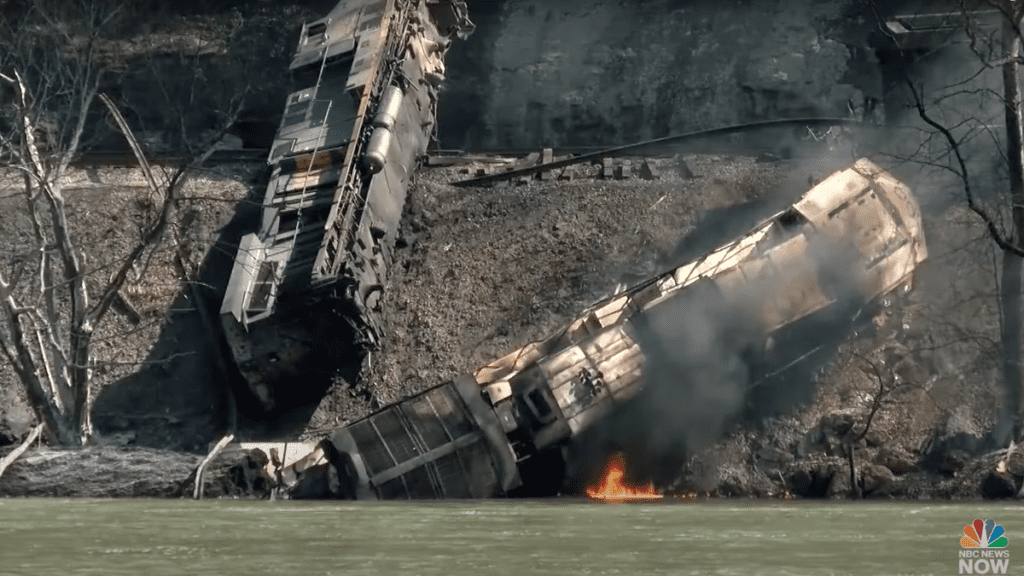Another Train Derailment Is Destroying a Federally Protected River in West Virginia

Our aging railway network is at it again, but this time disaster has struck in West Virginia. A train derailment on March 8 has resulted in an “unknown” amount of diesel fuel and oil spilling into a river. According to CBS News, that river just happens to be one of the oldest in North America, and it’s part of the National Park Service.
In case you missed it:
According to a press release from CSX, the train derailed in Sandstone, West Virginia after it “struck a rockslide” at about 4:51 a.m. on Wednesday. The crash caused all four of the train’s locomotives and nine empty coal trains to derail. There were three crew members onboard when the locomotive caught fire — a conductor, engineer and engineer trainee. CSX says that they were all “evaluated and treated for non-life threatening injuries.”
The company says that there is no danger to the public, as there weren’t any hazardous materials on the train. But CSX does admit it has no idea how much diesel fuel and oil spilled into the New River. It says that environmental measures are being deployed to deal with the contamination.
G/O Media may get a commission
This news comes on the same day that Norfolk Souther’s CEO is facing a senate hearing on railroad safety after the disastrous crash in East Palatine, Ohio, according to ABC News. Alan Shaw reportedly apologized during the hearing and promised to “make it right.”
CBS reports that West Virginia Emergency Management said downstream public water systems were notified of the situation and are currently monitoring for “potential public health impact.” West Virginia American Water has reportedly also been notified and is now monitoring water quality. The organization has temporarily stopped drawing water from the New River and it will “enhance its treatment process, as necessary.”
“Customers should see no impact to their service as a result of this action. The health and safety of our customers is a priority, and there are currently no drinking water advisories in place because of this incident,” American Water said in a press release.
It added that if a drinking water advisory should become necessary, American Water will issue one.
CBS says that this whole thing could still have an impact on the environment despite the fact there weren’t any hazardous materials onboard.
The New River is considered one of the oldest rivers in North America. According to the National Park Service, it’s widely believed that the waterway “has been in its present course for at least 65 million years.” It once ran through Central Ohio, Indiana and Illinois before going into the Mississippi, but much of it got diverted about 10,000 years ago when it was impacted by glacial ice, the service said.
[…]
When the empty coal train went off the tracks, video shows some of the cars ended up in or along the bank of the New River. That area is part of the 53 miles of the river that’s maintained by the National Park Service within the New River Gorge National Park and Preserve.
When oil gets into freshwater bodies, it can cause significant damage depending on the amount involved.
The outlet says that according to the EPS, oil spills in freshwater bodies can still cause significant damage even though those sorts of spills aren’t covered as widely as ones in saltwater bodies like an ocean.
“Freshwater bodies are highly sensitive to oil spills and are important to human health and the environment,” the EPA told CBS News.
There is some good news though. Because the New River is a flowing waterway, the impact will apparently be less severe than if the diesel and oil flowed into standing water. Since the water is moving, the contaminants don’t have the chance to “cling” to plants. That means it is less likely to contaminate the animals that eat those eplants. The EPA goes on to say that oil can end up disrupting local ecology when it gets trapped within rocks in the water.
CBS News says that CSX will be held responsible for cleaning up the derailment site since the company owns 12 feet “from the middle of the track to either side.”
“The safety of our employees and the community is our top priority as we dispatch our teams to assess the situation and develop a plan to completely restore the area,” CSX said in its release. “Our team is in close contact with local police and fire officials and we will continue to work closely with them on our recovery efforts.”



